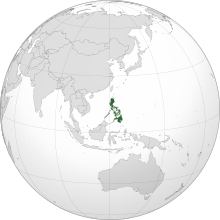LGBT in the Philippines
|
LGBT rights in the Philippines |
|
|---|---|

|
|
| Same-sex sexual activity legal? | Legal |
| Military service | Gays, lesbians and bisexuals allowed to serve openly since 2009 |
| Discrimination protections | None at the national level but many anti-discrimination ordinances exist at the local government level. |
| Family rights | |
| Recognition of relationships |
None |
|
Restrictions:
|
The Family Code of the Philippines defines marriage as "a special contract of permanent union between a man and a woman". The Constitution of the Philippines does not prohibit same-sex marriage. |
| Adoption | Allowed for individuals but not allowed for same-sex couples. |
Although lesbian, gay, bisexual and transgender (LGBT) people in the Philippines have a distinctive culture, their legal rights are limited. Gays and lesbians are generally tolerated (if not accepted) in Filipino society, but widespread discrimination remains. Filipino gays are known as bakla.
According to the 2002 Young Adult Fertility and Sexuality Survey, 11 percent of sexually-active Filipinos between the ages of 15 and 24 have had sex with someone of the same sex. According to Filipino poet and critic Lilia Quindoza Santiago, Filipino culture may have a more flexible concept of gender; kasarian (Tagalog for "gender") is defined in less binary terms than the English word;kasarian means "kind, species, or genus".
Bakla and bading are Tagalog words for a man who has feminine mannerisms, or dresses or identifies as a woman. Although the terms are not the equivalent of the English "gay", the bakla are the most culturally-visible subset of gay men in the Philippines. They are often considered a third gender, embodying femininity (pagkababae) in a male body. Although bakla is sometimes used in a derogatory sense, bakla people have largely embraced it.
The bakla are socially and economically integrated into Filipino society. A common stereotype is a parlorista, a cross-dresser who works in a salon.Miss Gay Philippines is a bakla beauty pageant.
In the Philippines, the word "gay" is used to refer to any LGBT person. For Filipino gays the Tagalog phrase paglaladlad ng kapa ("unfurling the cape") or, more commonly, paglaladlad ("unfurling" or "unveiling") refers to the coming-out process. Some lesbians (butch and femme) use the words magic or shunggril to refer to themselves;paminta describes masculine gay men. Neutral slang terms for gay men include "billy boy", badette and bading. Although many of these terms are considered derogatory, they are sometimes used casually or jokingly by the Filipino gay and lesbian community.
...
Wikipedia
